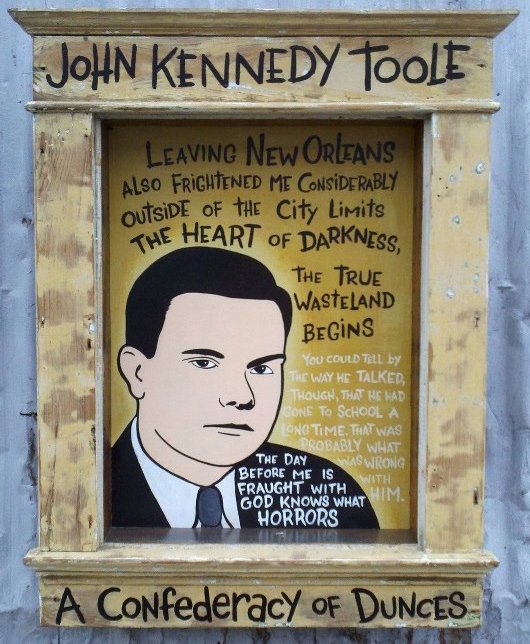ADSactly Literature: For the Love of Cult Authors: John Kennedy Toole

What exactly is a “cult author”? Not someone who writes about cults, certainly, but rather a writer who had (either during his lifetime or posthumously) gathered a cult following – squadrons of rabid fans re-reading his or her books over and over and quoting them to anyone who’s willing to listen.
It’s tricky to define exactly what makes a cult book, but chances are you’ll know when you read one. It’s often something obscure, because our society is obsessed with the strange and quirky. A cult author often comes at ya from the fringes of society, they write about the subcultures, about the downtrodden, about the underground. They represent that world you’d kinda like to inhabit, but are often too scared to do so. And often enough, they become the fascination of a lifetime.
In this new @adsactly series, we’ll be taking a look at several “cult authors” who mesmerize audiences well after their deaths. Last time, we talked about Beat icon Jack Kerouac, and now, we turn our attention to the reclusive American writer, John Kennedy Toole (as it happens, an admirer of the Beat poets).
Toole only ever wrote two novels and is mainly known for the latter, A Confederacy of Dunces. It’s quite a popular title, having won the Pulitzer Prize, and chances are you’ve heard it referenced at some point. Now, A Confederacy has always been a difficult novel. You either love it and become obsessed by it, or you abhor it. But whatever your personal opinion about the book, one thing is indisputable – it has, in the past 50 years or so, amassed quite the following.
But we’re getting ahead of ourselves and should start, really, at the beginning. John Kennedy Toole, known throughout his life as Ken, led a rather sad existence.
Born in New Orleans, in 1937, to a family of Irish/French immigrants, Ken had a very close relationship with his mother from the get-go. She instilled into him a love of culture and took Ken’s upbringing very seriously, becoming almost tyrannical at times during Ken’s childhood.
Toole’s relationship with his mother, Thelma, was definitely one of the most defining in his life, mainly because Thelma was a very controlling woman. She seemed to be convinced that all the talent in the world rested in her child and that he simply must achieve greatness. Poor Toole struggled to live up to his mother’s impossible expectations all his life. He was haunted by a desire to excel, because of this.
Thelma took him to have an IQ test when he was six, causing him to skip ahead a grade. When the boy was ten, she assembled a group of child actors (with her son as the star, obviously) and had him perform various shows, model in ads and appear on radio shows for children. What a lovely, no-pressure environment to grow up in, right?

Thelma Toole with a copy of her son's posthumously published novel src
Toole’s relationship with his dad, in contrast, was relaxed. They bonded over baseball and sports, but his father had very little say in his child’s upbringing.
During Toole’s teen years, he started spending less and less time at home. He would often hang around the house of his friend Larry McGee every day, without fail. He even began dating McGee’s sister, just to have an excuse to get away from his own home.
Yet, he maintained his high grades throughout high school and received a full scholarship at age 17 from Tulane University.
As a student, Toole seems to have been well-liked by his fellow students. He was fun and easy-going and often performed comic routines at parties. It’s interesting to note that, at one point, his mother visited him on campus. During this time, his friends noted a drastic change in Toole’s behavior. He seemed to be ill at ease when his mother was there and distanced himself from his friends.
He worked as a professor for some time and later, served some time in the army. He was well-liked there, as well, at least at first. But various conflicts arose between Toole and the other men, which in the end, alienated Toole.
It was during this time he began work on A Confederacy of Dunces, a satirical book about a young, obese man, a self-styled philosopher who lives with his mother and is forced to undertake all sorts of menial jobs, due to financial difficulties. Although Toole claimed that the main character, Ignatius J. Reilly is based on acquaintances, most importantly on a college professor, the similarities between Reilly and Toole himself are staggering. Several of Reilly’s friends insisted that the character was just another representation of Toole himself.
After being discharged from the army, Toole returned home and moved in with his mother, where he completed Dunces, but failed to attract a publisher. He came into contact with editor Robert Gottlieb (who’d encouraged a then-unknown Joseph Heller to finish Catch-22), who showed interest in the manuscript, but insisted Toole make several revisions.
Toole worked on Dunces quite a bit, but failed to satisfy Gottlieb’s requests. The editor, however, remained friendly and overall encouraging of the young writer.
For a man so obsessed with success and proving his worth and talent, such a blatant rejection must’ve been hard to stomach. Over the last few years of his short life, Toole became more and more withdrawn and depressed. His friends noted that he became more and more paranoid and with a deep sense of personal persecution (very probably stemming from his difficult relationship with Thelma and his perceived failure as an author).
Toole tragically took his own life in 1969, at the very young age of 31. It was through his mother’s doggedness that A Confederacy of Dunces was published. A few years after her son’s untimely demise, she hounded publishers with the manuscripts, determined that her son should achieve the greatness she desired of him, even if posthumously.
Eventually, the book was published, 11 years after its author’s death, and even received the Pulitzer prize.

Like with many famous artists with tragic lives, it’s difficult to see how much of Toole’s fame is his own merit and how much is due to this horrible story.
As it is to be expected, Toole’s life drew in many people and the tragic background of the novel surely helped build its now cult following.
Toole, like his main character Ignatius, wasn’t really a hero and although comic in nature, there is something very dark and upsetting about Dunces, which I suppose resonates with a lot of people. There has always been a deep fascination for figures off the fringe, for the quirky and A Confederacy of Dunces certainly is that.
Authored by @honeydue
References: Wiki; John Kennedy Toole's Brilliant but Short Career
Click on the coin to join our Discord Chat

Witness proposal is here:
Go To Steem Witness Page
In the bottom of the page type: adsactly-witness and press vote.

Use small letters and no "@" sign. Or, click here to vote directly!
Thank you!


Thanks for sharing such a Sad story! Toole's tragedy reminds me of my late American husband's tragic life. It seems that there is a similarity between them: Toole had a mother who was a controlling woman, he had a controlling American exwife.
Many times the people who love you can really be your biggest suffering. In order to live up to their expectations to you, "you kill yourself to try to please them..." which is the precise word written from my American husband about his previous marriage to me.
Till his sudden death in China, I guess he still belonged to his previous marriage. As result, I become a scapegoat, being slandered and hated by his American family...God knows how I worship him as my dearest English teacher!
Hi @adsactly thanks for supporting me this is my 1st monthsary at steemit please visit my blog if you have time
https://steemit.com/steemit/@article.colector/happily-1st-monthsary-on-steemit-my-30-days-report
Hi, @adsactly!
You just got a 0.39% upvote from SteemPlus!
To get higher upvotes, earn more SteemPlus Points (SPP). On your Steemit wallet, check your SPP balance and click on "How to earn SPP?" to find out all the ways to earn.
If you're not using SteemPlus yet, please check our last posts in here to see the many ways in which SteemPlus can improve your Steem experience on Steemit and Busy.
Hmm, great story @adsactly, sad though but inspiring
Unfortunately I am not lucky enough to have read John Kennedy Toole, although I had some reference to him. In my country (Venezuela) there are certain books that didn't arrive (I don't know if there is a Spanish translation) before the terrible crisis of the last few years (now less, of course). Your biographical sketch is quite complete, as it usually is, and is very well illustrated. One might venture to conjecture that, possibly, that somewhat suffocating relationship (as the psychiatry says) of his mother with her son had some weight in Kennedy Toole's difficult life performance. Thank you for introducing us to this interesting writer, @honeydue. Greetings.
To be honest, @honeydue, I had not read much about this writer and I have never read his great work The Conjuration of the Fools, although I have seen it reviewed when they talk about literature and humor. When reading your excellent review I can not stop thinking about what I have said on previous occasions: how childhood and relationships with the family can negatively mark people. Although many will say that the publication of Toole's work was thanks to the mother, she surely was also the culprit of the writer's suicide. Those relationships between parents and children that hurt. Thanks for sharing this author!
life is often not as imagined. in this Life story we are made aware of the fact that good intentions to develop children's abilities often make a "prison" for children. often spur achievement and the ability to make children as machines that can be pushed without stopping so children become victims.
for that, we need to realize that giving opportunities to grow and develop in accordance with nature will be better. fortunately, Tole has shown to the world that he is able to work, even though his masterpiece was only discovered after his death. What's more interesting is that he gave us an example. although in the end we also knew that he had an unfortunate fate.
you explain it interestingly so that you feel like reading a biography completely.
thank you @honeydue
thank you @adsactly
thank you steemit
warm regard from indonesia